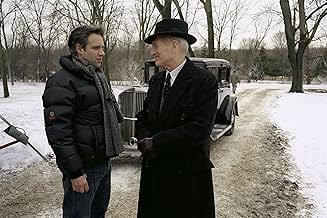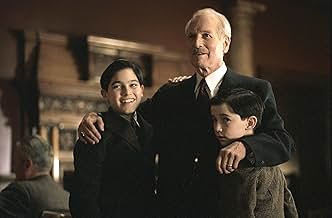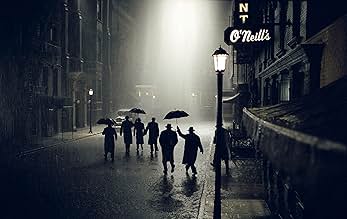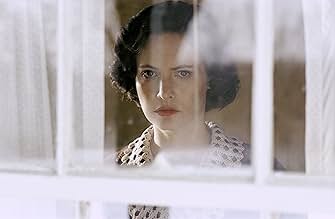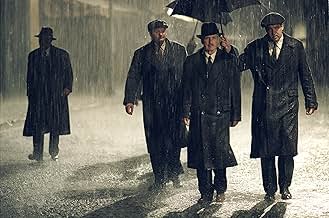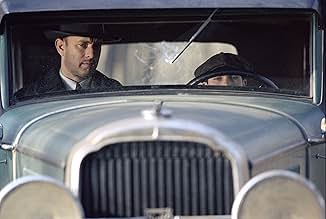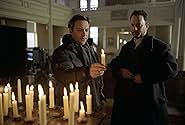El hijo de un mafioso es testigo de un asesinato, lo que obliga a él y a su padre a escapar por un camino de redención y venganza.El hijo de un mafioso es testigo de un asesinato, lo que obliga a él y a su padre a escapar por un camino de redención y venganza.El hijo de un mafioso es testigo de un asesinato, lo que obliga a él y a su padre a escapar por un camino de redención y venganza.
- Dirección
- Guionistas
- Elenco
- Ganó 1 premio Óscar
- 23 premios ganados y 82 nominaciones en total
Stephen P. Dunn
- Finn McGovern's Henchman
- (as Stephen Dunn)
- Dirección
- Guionistas
- Todo el elenco y el equipo
- Producción, taquilla y más en IMDbPro
Opiniones destacadas
This is a splendid movie which fancies itself a revenger father called Michael Sullivan (Tom Hanks) , he is right-hand to Mr Rooney (Paul Newman) who has a nasty son (Daniel Craig) . When the mob enforcer's son (Tyler Hoechlin) spies , he's in for a shock and things go wrong . All of them put Sullivan at odds with Rooney who is forced to side with his son , making Sullivan an enemy of the mob . Sullivan then takes action to protect his family and to put an end to the threat . Forcing him and his son on the run and to take to the road . Pray for Michael Sullivan . Every father is a hero to his son . Every son holds the future for his father . The innocence of a son is surpassed only by the father's will to save it.
Based on the dark graphic novel by Max Collins and Richard Piers Rayner adapted faithfully by David Self. Anyone with a fondness for mobster movies will find quite a bit to admire this fabulous film . This is a magnificent picture , except that the yarn turns so much bathetic and extremely sentimental , at times . This thought-provoking material blends comic-strip , a tridimensional kid's eye pastiche and ordinary mobster movie , though remains fundamentally in comic-book wake . Cast is pretty well , giving outstanding acting . Highlighted by Hanks' acting as father down a path of redemption and revenge , though some critics state Tom is fatally miscast . Paul Newman as mob boss and Daniel Craig are good , the latter as the rutlhess partner in crime . Jude Law as the terminally self-conscious hit-man steals of show as a whacked weegee-style photographer . Other prestigious actors appearing are the following ones : Dylan Baker , Ciran Hinds , Jennifer Jason Leigh and Stanley Tucci as Frank Nitti
The film packs a colorful and glimmering cinematography by Conrad Hall , who previously brought American Beauty , to whom the film is dedicated . It was shot in various locations as Grand Rapids, Saugatuck, Zeeland , Michigan , Pullman , Chicago , Geneva , Evanston , Momence , Beecher , Thornton , Illinois . As well as sensitive and rousing musical score by Thomas Newman. Being lavishly produced by Joan Bradshaw , Walter F. Parkes , Dean Zanuck , Richard D. Zanuck and Sam Mendes himself . This gangster picture was well directed by Sam Mendes , though with no originaly . Mendes is a good director who has made some successful films played by important actors , such as : Jarhead , American Beauty , Revolutionary road , this Road to perdition and two Bond movies : Skyfall and Spectre . Rating: 8/10 . Above average. Well worth watching . Essential and indispensable watching .
Based on the dark graphic novel by Max Collins and Richard Piers Rayner adapted faithfully by David Self. Anyone with a fondness for mobster movies will find quite a bit to admire this fabulous film . This is a magnificent picture , except that the yarn turns so much bathetic and extremely sentimental , at times . This thought-provoking material blends comic-strip , a tridimensional kid's eye pastiche and ordinary mobster movie , though remains fundamentally in comic-book wake . Cast is pretty well , giving outstanding acting . Highlighted by Hanks' acting as father down a path of redemption and revenge , though some critics state Tom is fatally miscast . Paul Newman as mob boss and Daniel Craig are good , the latter as the rutlhess partner in crime . Jude Law as the terminally self-conscious hit-man steals of show as a whacked weegee-style photographer . Other prestigious actors appearing are the following ones : Dylan Baker , Ciran Hinds , Jennifer Jason Leigh and Stanley Tucci as Frank Nitti
The film packs a colorful and glimmering cinematography by Conrad Hall , who previously brought American Beauty , to whom the film is dedicated . It was shot in various locations as Grand Rapids, Saugatuck, Zeeland , Michigan , Pullman , Chicago , Geneva , Evanston , Momence , Beecher , Thornton , Illinois . As well as sensitive and rousing musical score by Thomas Newman. Being lavishly produced by Joan Bradshaw , Walter F. Parkes , Dean Zanuck , Richard D. Zanuck and Sam Mendes himself . This gangster picture was well directed by Sam Mendes , though with no originaly . Mendes is a good director who has made some successful films played by important actors , such as : Jarhead , American Beauty , Revolutionary road , this Road to perdition and two Bond movies : Skyfall and Spectre . Rating: 8/10 . Above average. Well worth watching . Essential and indispensable watching .
Conrad Hall went out with a bang. The great film photographer finished his illustrious career with this movie before passing on. He did himself proud as this is one of the best-looking crime films you'll ever see.
Of course, the acting ain't bad when you have Tom Hanks and Paul Newman playing the leads! The amount of action in here is just right, too: not too much; not too little.
None of the characters in here, frankly, are "good guys" as Hanks is a professional hit-man for town boss Newman. Hanks' only redeeming quality is not wanting his young son to wind up a killer like him, although he does teach him how to be the getaway man in robberies! Huh?
As good as the acting is and as interesting as the story is, the real star of this film is cinematographer Hall, who paints scene after beautiful scene with his lens. His work is just awesome.
Of course, the acting ain't bad when you have Tom Hanks and Paul Newman playing the leads! The amount of action in here is just right, too: not too much; not too little.
None of the characters in here, frankly, are "good guys" as Hanks is a professional hit-man for town boss Newman. Hanks' only redeeming quality is not wanting his young son to wind up a killer like him, although he does teach him how to be the getaway man in robberies! Huh?
As good as the acting is and as interesting as the story is, the real star of this film is cinematographer Hall, who paints scene after beautiful scene with his lens. His work is just awesome.
Ever since Coppola's "The Godfather" came out in 1972, just about every auteur director working in America seems to have cherished the ambition to produce his own "Godfather", hence crime epics like Scorsese's "Goodfellas", Leone's "Once Upon a Time in America", De Palma's remake of "Scarface", the Coen brothers' "Miller's Crossing" and Tarantino's "Pulp Fiction". Following his acclaimed first film "American Beauty", Sam Mendes obviously decided that the it was time to make his own "Godfather", because his second film, "Road to Perdition" is a gangster drama in this tradition.
Michael Sullivan junior is a twelve-year-old schoolboy from Rock Island, Illinois. Although it is the early 1930s, the time of the Great Depression, the Irish-American Sullivan family enjoys a comfortable upper-middle-class existence. Young Michael, however, is puzzled about what his father, Michael senior, actually does for a living; all he knows is that he works for John Rooney, a seemingly respectable elderly gentleman who treats the boy like an adopted grandson. The truth, however, is that Rooney is an organised crime boss and Michael senior his "enforcer" When young Michael stumbles on the truth, after witnessing Rooney's unstable son Connor killing another gang member, he inadvertently puts himself and his family in danger. In an attempt to eliminate the boy, Connor murders his mother Annie and younger brother Peter, forcing Michael and his father to flee for their lives. The rest of the film deals with Michael senior's search for revenge for the deaths of Annie and Peter.
The title can be understood on a number of levels. On the most literal, Perdition is a town to which some of the characters travel at the end of the film. On another level, "perdition" can be interpreted as meaning "death" or "destruction", and on a third "eternal damnation". Perhaps the film's bleakest moment comes when Rooney says to Michael senior that "none of us have any hope of getting to Heaven". This is not just a figure of speech. Rooney is a practising Catholic who has nevertheless embarked upon a way of life which he believes can only result in his damnation to Hell. The film's emphasis on the futility and sterility of the criminal lifestyle is reminiscent of that great British gangster movie, "Get Carter".
The bleakness of the film's moral message is emphasised by its visual style, dominated by a muted palette with dark backgrounds and dull greens and greys. Filming took place in winter and early spring, often against a backdrop of snow and rain; Mendes intended the cold, bleak look of the film to reflect the characters' emotional states. Water, snow and ice are recurrent visual images throughout, from the snowy opening funeral scene with a corpse on ice to the closing scenes by Lake Michigan. The film's emotional impact is also heightened by Thomas Newman's evocative, elegiac musical score.
The film's two most important characters are Michael senior and Rooney, who loves Michael like a son, and yet tries to kill him to save his biological son Connor. In some ways the audience can sympathise with Michael, a man who has suffered unjustly through the deaths of two innocent family members, and this sense of identification is strengthened by the casting of Tom Hanks, an actor normally seen as sympathetic characters. On another level, however, we recognise Michael's moral responsibility for his own predicament as one of those who live by the sword and are therefore doomed to die by the sword as each killing fuels the cycle of revenge and leads to yet more bloodshed. This is one of Hanks's most accomplished performances as he is able to show both these sides of Michael's personality. One of his redeeming characteristics is his love for his son, who he hopes will be able to lead a better life than the one he himself has led, and the film ends on a note of hope in this regard.
This was to be Paul Newman's last appearance in a feature film, and it was to be a fine end to his distinguished career. Although Rooney is a lifelong villain, he is not wholly evil, but a tired, disillusioned old man, in Wilfred Owen's phrase a "devil sick of sin", who retains enough moral awareness to realise that his false system of values has blighted his life and the lives of others. The other notable performance comes from an almost unrecognisable Jude Law as Harlen Maguire, the hit-man sent by Rooney to kill Sullivan. Maguire also works as a crime-scene photographer, and the relish with which he photographs murder victims reveals a macabre fascination with death. In his remorselessness Maguire recalls Anton Chigurh, the hit-man played by Javier Bardem in "No Country for Old Men", although to my mind Law gives a better performance than Bardem. Maguire, for all his evil, is a recognisable human being whereas the one-dimensional Chigurh seems more like a personification of some abstraction such as "death" or "fate".
The "my own Godfather" syndrome means that the organised crime epic has become something of an overcrowded field in the last forty years, but I must say that "Road to Perdition" is one of the most impressive entries in that field. I was impressed by Conrad Hall's breathtaking cinematography, by the standards of acting and by an intelligent script with its themes of father-son relationships, of the ethics of revenge and of the consequences of violence. Above all I was impressed by Mendes's ability to weave all these elements into a mythic whole, an epic which manages to say something new in the otherwise clichéd gangster genre. When I reviewed "American Beauty" I said that Mendes had joined that elite group of directors (Orson Wells, Sidney Lumet, Bryan Forbes, Stuart Rosenberg) who had made a masterpiece with their first film. With "Road to Perdition" he has joined that even smaller group who have made masterpieces with their first two films. 9/10
Michael Sullivan junior is a twelve-year-old schoolboy from Rock Island, Illinois. Although it is the early 1930s, the time of the Great Depression, the Irish-American Sullivan family enjoys a comfortable upper-middle-class existence. Young Michael, however, is puzzled about what his father, Michael senior, actually does for a living; all he knows is that he works for John Rooney, a seemingly respectable elderly gentleman who treats the boy like an adopted grandson. The truth, however, is that Rooney is an organised crime boss and Michael senior his "enforcer" When young Michael stumbles on the truth, after witnessing Rooney's unstable son Connor killing another gang member, he inadvertently puts himself and his family in danger. In an attempt to eliminate the boy, Connor murders his mother Annie and younger brother Peter, forcing Michael and his father to flee for their lives. The rest of the film deals with Michael senior's search for revenge for the deaths of Annie and Peter.
The title can be understood on a number of levels. On the most literal, Perdition is a town to which some of the characters travel at the end of the film. On another level, "perdition" can be interpreted as meaning "death" or "destruction", and on a third "eternal damnation". Perhaps the film's bleakest moment comes when Rooney says to Michael senior that "none of us have any hope of getting to Heaven". This is not just a figure of speech. Rooney is a practising Catholic who has nevertheless embarked upon a way of life which he believes can only result in his damnation to Hell. The film's emphasis on the futility and sterility of the criminal lifestyle is reminiscent of that great British gangster movie, "Get Carter".
The bleakness of the film's moral message is emphasised by its visual style, dominated by a muted palette with dark backgrounds and dull greens and greys. Filming took place in winter and early spring, often against a backdrop of snow and rain; Mendes intended the cold, bleak look of the film to reflect the characters' emotional states. Water, snow and ice are recurrent visual images throughout, from the snowy opening funeral scene with a corpse on ice to the closing scenes by Lake Michigan. The film's emotional impact is also heightened by Thomas Newman's evocative, elegiac musical score.
The film's two most important characters are Michael senior and Rooney, who loves Michael like a son, and yet tries to kill him to save his biological son Connor. In some ways the audience can sympathise with Michael, a man who has suffered unjustly through the deaths of two innocent family members, and this sense of identification is strengthened by the casting of Tom Hanks, an actor normally seen as sympathetic characters. On another level, however, we recognise Michael's moral responsibility for his own predicament as one of those who live by the sword and are therefore doomed to die by the sword as each killing fuels the cycle of revenge and leads to yet more bloodshed. This is one of Hanks's most accomplished performances as he is able to show both these sides of Michael's personality. One of his redeeming characteristics is his love for his son, who he hopes will be able to lead a better life than the one he himself has led, and the film ends on a note of hope in this regard.
This was to be Paul Newman's last appearance in a feature film, and it was to be a fine end to his distinguished career. Although Rooney is a lifelong villain, he is not wholly evil, but a tired, disillusioned old man, in Wilfred Owen's phrase a "devil sick of sin", who retains enough moral awareness to realise that his false system of values has blighted his life and the lives of others. The other notable performance comes from an almost unrecognisable Jude Law as Harlen Maguire, the hit-man sent by Rooney to kill Sullivan. Maguire also works as a crime-scene photographer, and the relish with which he photographs murder victims reveals a macabre fascination with death. In his remorselessness Maguire recalls Anton Chigurh, the hit-man played by Javier Bardem in "No Country for Old Men", although to my mind Law gives a better performance than Bardem. Maguire, for all his evil, is a recognisable human being whereas the one-dimensional Chigurh seems more like a personification of some abstraction such as "death" or "fate".
The "my own Godfather" syndrome means that the organised crime epic has become something of an overcrowded field in the last forty years, but I must say that "Road to Perdition" is one of the most impressive entries in that field. I was impressed by Conrad Hall's breathtaking cinematography, by the standards of acting and by an intelligent script with its themes of father-son relationships, of the ethics of revenge and of the consequences of violence. Above all I was impressed by Mendes's ability to weave all these elements into a mythic whole, an epic which manages to say something new in the otherwise clichéd gangster genre. When I reviewed "American Beauty" I said that Mendes had joined that elite group of directors (Orson Wells, Sidney Lumet, Bryan Forbes, Stuart Rosenberg) who had made a masterpiece with their first film. With "Road to Perdition" he has joined that even smaller group who have made masterpieces with their first two films. 9/10
Many have either hated, loved, or been let down by this film. Hype does terrible things to the best and worst of things. Most of the reasons i have heard for not liking this film are ridiculous. Let me just tell you, if you have not seen it yet, go see it. Even if for some reason you don't think its amazing, it will be among the best films you have seen of the year anyways. Road to Perdition is a beautiful movie, both visually and in performance. Every actor here is deserving of acclaim and Academy attention, mainly Jude Law. Any emotional detachment is intentional; It is a tragic story, one of betrayal, love, bonds, and revenge. There is no doubt this film will become a classic. Don't dare compare it with Godfather: this is a GANGSTER film, not a MAFIA movie! Godfather will never be surpassed, so don't compare to it. Road to Perdition as of now is the leading Best Picture Oscar contender. Unlike past years, it deserves it.
`Road to Perdition' is a rocky road of revenge and reconciliation, punctuated by some gorgeous Conrad Hall cinematography. Tom Hanks is a 1930's mob hit man whose 12 year-old son sees him commit a murder. The rest of Director Sam Mendes' (`American Beauty') film is the boy's coming to terms with that knowledge. Paul Newman plays a `godfather,' a father to his errant son and like a father to Hanks.
Laced throughout are 3 father-son relationships, which seem to move toward the violent ends reserved for mobsters. Hanks' son is ambivalent about his dad, whom he seems to adore yet hold accountable for his crimes. Newman's son is like Sonny Corleone, too loose to be in charge and no heir apparent; Hanks owes his lifestyle to Newman-all these relationships are subsumed by the business needs of the larger organization.
This is noir with a dark palette, costuming in clothes metaphorically heavy, and sounding often as stylized and minimal as the murders Hanks commits. `Road to Perdition' lacks the grandeur of Coppola's `Godfather' epic, but it succeeds in evoking an old-testament judicial system where eye meets eye and tooth savages tooth. The revenge motif is too dominant to let the film rest on the promising father-son motif.
Hanks' son learns about morality and decides about following in his father's footsteps. Hanks gives another controlled performance, and Paul Newman lets us know there is room for one more powerful screen godfather.
Laced throughout are 3 father-son relationships, which seem to move toward the violent ends reserved for mobsters. Hanks' son is ambivalent about his dad, whom he seems to adore yet hold accountable for his crimes. Newman's son is like Sonny Corleone, too loose to be in charge and no heir apparent; Hanks owes his lifestyle to Newman-all these relationships are subsumed by the business needs of the larger organization.
This is noir with a dark palette, costuming in clothes metaphorically heavy, and sounding often as stylized and minimal as the murders Hanks commits. `Road to Perdition' lacks the grandeur of Coppola's `Godfather' epic, but it succeeds in evoking an old-testament judicial system where eye meets eye and tooth savages tooth. The revenge motif is too dominant to let the film rest on the promising father-son motif.
Hanks' son learns about morality and decides about following in his father's footsteps. Hanks gives another controlled performance, and Paul Newman lets us know there is room for one more powerful screen godfather.
¿Sabías que…?
- TriviaFor the bank robberies sequence, Tyler Hoechlin (Michael Sullivan, Jr.) had to learn to drive, something he was only too happy to do. Hoechlin mastered it all easily, but, just to be on the safe side, a stunt driver was sitting in the back, with his own set of driving controls.
- ErroresIn that era, gentlemen removed their hats indoors, particularly in places like diners. Even not-so gentlemen. To not do so would have attracted attention.
- Citas
Michael Sullivan, Jr.: So when do I get my share of the money?
Michael Sullivan: Well... how much do you want?
Michael Sullivan, Jr.: Two hundred dollars.
Michael Sullivan: Okay. Deal.
[Michael Jr. stops eating and thinks for awhile]
Michael Sullivan, Jr.: Could I have had more?
Michael Sullivan: You'll never know.
- Créditos curiososThanks to all at the Donmar Warehouse Theatre, London
- ConexionesFeatured in The Making of 'Road to Perdition' (2002)
- Bandas sonorasWhose Honey Are You?
Music by J. Fred Coots (as Fred J. Coots)
Lyrics by Haven Gillespie
Performed by Ruth Etting
Courtesy of Take Two Records
Selecciones populares
Inicia sesión para calificar y agrega a la lista de videos para obtener recomendaciones personalizadas
Detalles
- Fecha de lanzamiento
- País de origen
- Sitio oficial
- Idioma
- También se conoce como
- Road to Perdition
- Locaciones de filmación
- Productoras
- Ver más créditos de la compañía en IMDbPro
Taquilla
- Presupuesto
- USD 80,000,000 (estimado)
- Total en EE. UU. y Canadá
- USD 104,454,762
- Fin de semana de estreno en EE. UU. y Canadá
- USD 22,079,481
- 14 jul 2002
- Total a nivel mundial
- USD 181,001,478
- Tiempo de ejecución1 hora 57 minutos
- Color
- Mezcla de sonido
- Relación de aspecto
- 2.35 : 1
Contribuir a esta página
Sugiere una edición o agrega el contenido que falta

Principales brechas de datos
What is the streaming release date of Camino a la perdición (2002) in India?
Responda



